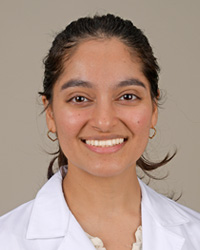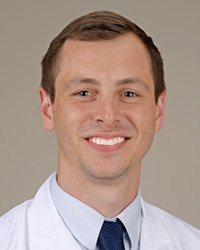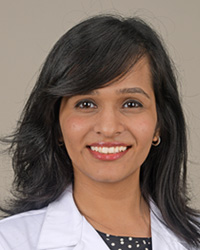Class of 2027 Spotlight
Fellow Spotlight

Amna Aijaz, MD
Where did you grow up? Karachi, Pakistan
Where did you go for Residency? Mount Sinai Beth Israel, NY
Why did you go into Cardiology? Saw a PCI on a STEMI pt and decided when in the ED on electives, and decided I wanted to do that
What are some strengths of the UTHealth Houston program? This is a quaternary care hospital that has everything you look for in a program, including structural, VAD/OHT, complex PCI, ECMO, advanced imaging, and CTS backup. We also rotate at MDA and LBJ, which offers a diverse experience. There are a lot of fellows who have made the schedule very manageable, even at first, when it is supposed to be the busiest. Program leadership takes fellow feedback seriously and helps accommodate everyone’s scheduling requests.
What are your future career goals after fellowship? AHF + /- interventional cardiology
What do you like to do in Houston? Go to Hermann Park with my daughter, eat out (lots of great food options for everyone).

Justin Durland, MD
Where did you grow up? Warwick, NY
Where did you go for Residency? MUSC in Charleston, SC
Why did you go into Cardiology? I went into cardiology because I love how it blends fast-paced clinical decision-making, like treating heart attacks, with a strong foundation in physiology.
What are some strengths of the UTHealth Houston program? I chose UTHealth Houston because of the people, hands-on training, and exposure to some of the newest technologies and mechanical support devices.
What are your future career goals after fellowship? I’m still exploring my next steps after fellowship, but I’ve always been drawn to staying within academic medicine.
What do you like to do in Houston? I’ve been enjoying Houston’s food scene, parks, and live music.

Kruthi Gandhi, MD
Where did you grow up? I was born and raised in Mumbai, India.
Where did you go for Residency? I did my internal medicine training at Mount Sinai Morningside-West in New York, NY.
Why did you go into Cardiology? Cardiology stands out to me because of its diversity—whether it’s the wide spectrum of pathology, the varied patient populations, or the range of treatments available. My interest developed in medical school and further solidified during residency. Given the global burden of cardiovascular disease, the ability to make a meaningful and tangible difference makes this journey deeply meaningful to me and continues to drive my commitment to this field. I am drawn to the high-risk, high-reward nature of this field—where time-critical decisions can change the course of a patient’s life, while also allowing us to form long-term, meaningful relationships with our patients.
What are some strengths of the UTHealth Houston program? One of the greatest strengths of the UTHealth Houston program is the unparalleled diversity in cardiovascular pathology and patient populations especially in advanced heart failure and transplant, interventional and imaging! We manage some of the most complex cases in the region, whether it’s mechanical circulatory support including ECMO and LVADs or complex interventional procedures. This combined with the cardio-oncology exposure at MD Anderson provides for an enriching training experience. Further, we have the opportunity to work with and learn from faculty members who are nationally recognized in their field and are amazing mentors. Above all, the fellows are extremely supportive of each other. On my interview day, it was evident that there is a strong sense of camaraderie among the fellows and faculty.
What are your future career goals after fellowship? I am interested in heart failure vs non-invasive/advanced imaging.
What do you like to do in Houston? Houston has great restaurants and hiking trails, which I love to explore!

Stephen John, MD
Where did you grow up? I grew up in Nepal and Michigan and completed my residency in internal medicine and pediatrics at the University of minnesota.
Where did you go for Residency? Prior to medicine I was a mechanical engineer. I appreciate how in cardiology we can reason through pressures, flow and pumping function.
What are some strengths of the UTHealth Houston program? Some of our programs strengths include a large volume of high acuity patients (more than enough echocardiograms, cardiac catheterizations etc. to go around! ) and supportive faculty members.

Harnoor Mann, MD
Where did you grow up? I grew up in Western Massachusetts
Where did you go for Residency? UPMC
Why did you go into Cardiology? The patient stories and physiology most motivating to me have always been those related to the heart. Heart issues are also often underdiagnosed in underrepresented populations, making Cardiology an important space for advocacy.
What are some strengths of the UTHealth Houston program? We see a diverse patient population with wide breadth of pathologies between the varying hospitals we rotate at, and have exposure to all of the cardiac imaging modalities, including cardiac PET.
What are your future career goals after fellowship? General vs. Advanced Heart Failure, maybe some Cardio-Obstetrics in the mix
What do you like to do in Houston? Explore the many amazing restaurants and coffee shops, go on long walks along the Buffalo Bayou and in Memorial Park, and spend time outside year-round with the warm weather.

Jong Kun Park, MD
Where did you grow up? Gainesville, Florida. Go Gators!
Where did you go for Residency? The University of Texas Health Science Center at Houston
Why did you go into Cardiology? I have a strong history of teachers in the family and cardiology was the medical community that was the most embracive of mentorship while I was in medical school and residency. The depth within cardiology both in the cerebral and procedural aspects always lent to the field being intellectually stimulating and richly diverse. The various modalities cardiologists are able to practice in such as optimizing medical therapies, performing cutting-edge interventions, and utilizing multimodal imaging methods bring the best and most varied aspects of medicine together.
What are some strengths of the UTHealth Houston program? I consider the broad range of pathology, various hospital setting experiences, and world-class teaching attendings to be the greatest strengths of the UTHealth Houston program. Through the three hospital systems, Memorial Hermann, MD Anderson Cancer Center, and the Harris Health System, we gain a comprehensive and dynamic training experience through exposure to a wide range of cardiovascular pathologies. From complex cardio-oncology patients in one of the world’s top cancer institutions to the most state-of-the-art imaging technologies and procedural techniques, our program prepares us for any practice setting and helps tailor to our individual career goals.
What are your future career goals after fellowship? Likely general cardiology for a large breadth of practice but currently considering subspecialty training particularly in light of great mentors and newly budding interests.
What do you like to do in Houston? A mix between exploring the prolific park/playground scene with my wife and daughter and the never-ending food scene. From Viet-Cajun crawfish to authentic tacos and BBQ, you’ll never run out of great places to eat. And Houston’s parks and playgrounds are underrated—it’s one of the best parts of living here, especially if you have kids, love the outdoors, or just want a good weekend spot to enjoy the weather.